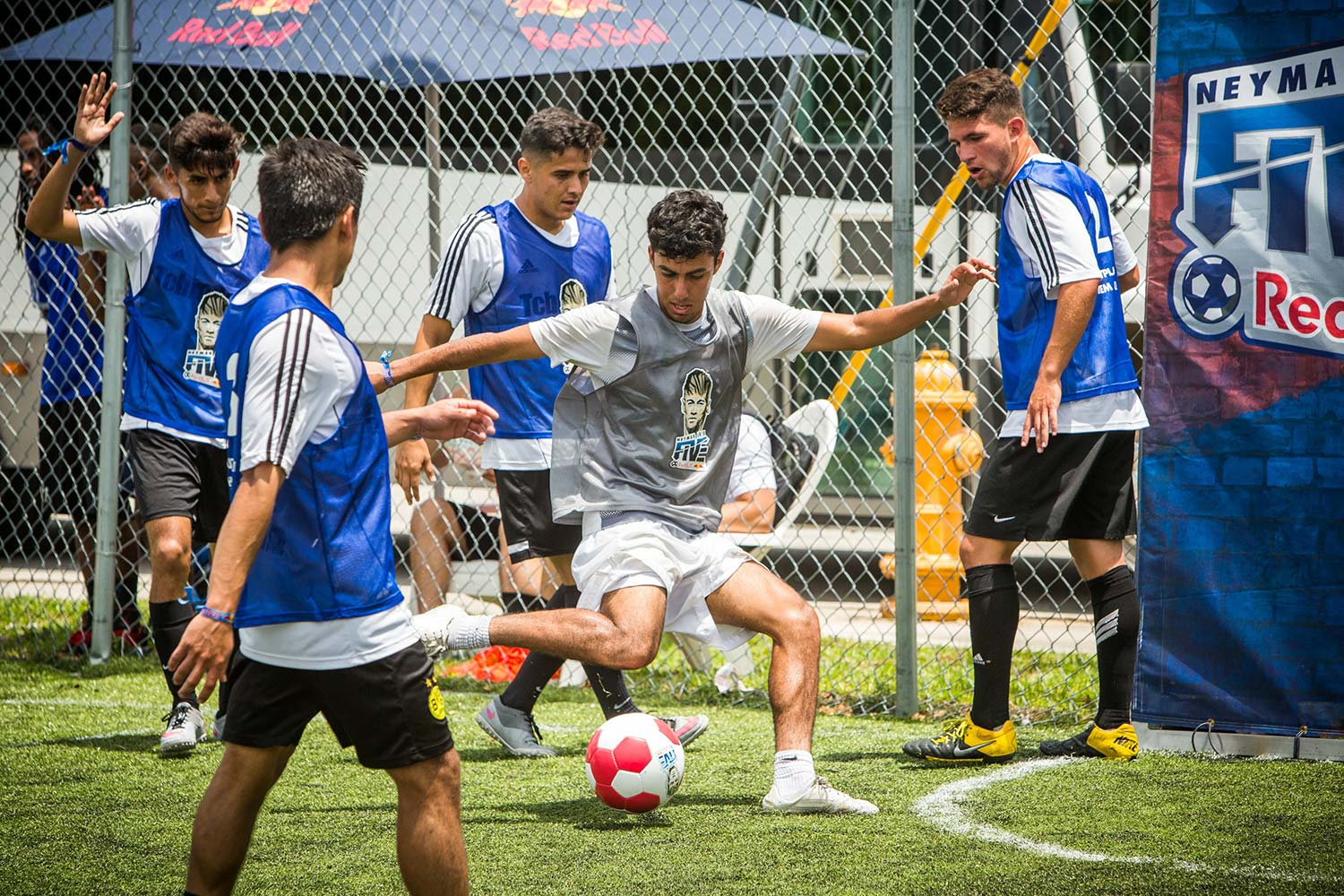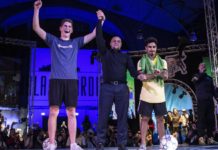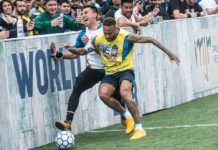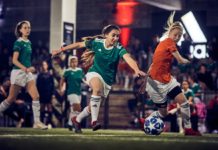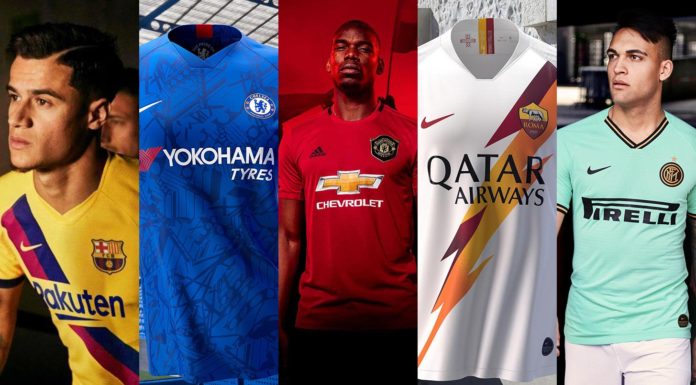The U.S. teams that made it to Miami, FL, this past weekend for the Red Bull Neymar Jr’s Five five-a-side regional finals faced off in an unconventional tournament of sorts: For outsiders, the lung-stuffing swampiness of Florida humidity was nearly unbearable while the temptations of Miami’s night life beckoned to all crews who had never visited the notorious party city. And of course, there were 16 of the best street crews from across the nation to play.
“It was ridiculously hot and ridiculously hard to play in. You’re like sweating after two seconds of being outside,” SDSJ’s Joel Adams recalled. For locals, like Jabronies’ Arthur Clapot, tho, “The weather was perfect.” In any case, travel, weather, and for many, a night of dehydrating fun, all came to light during the day-long tournament on June 11, which was hosted at the Wynwood Soccer facilities on turf fields, another interesting element that street crews adjusted to.
What the Neymar event does is give players a reward for all the love they have put into cultivating their street soccer scene.
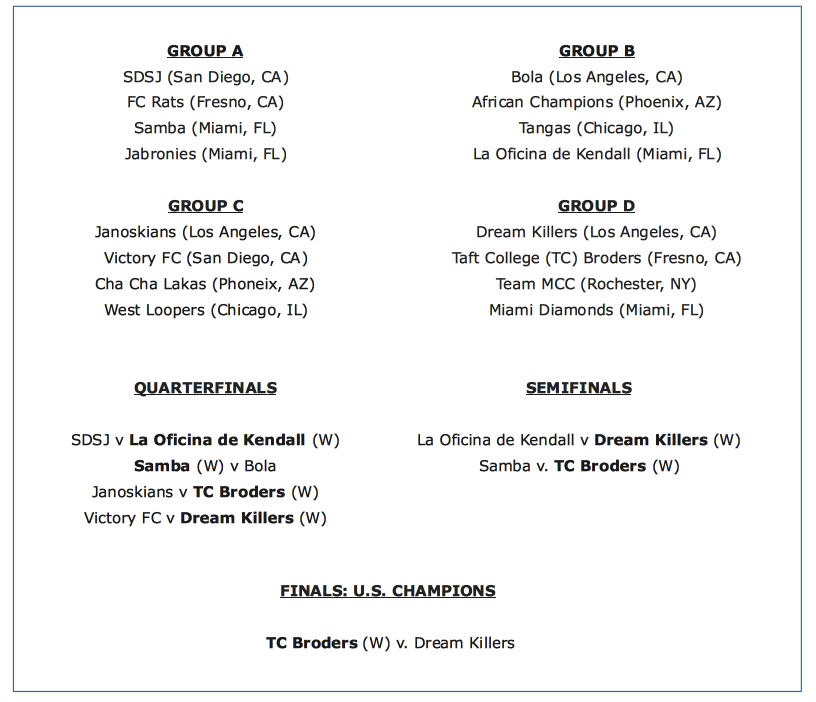 Tournament director Eddie Salcedo, whose company 11 Sports Media ran the nine U.S. qualifiers and Miami finals said, “The intensity from the first whistle was apparent, and the knock-out games took it up a notch.” In fact, for some crews competing that day, winning this tournament was more than just your average competition.
Tournament director Eddie Salcedo, whose company 11 Sports Media ran the nine U.S. qualifiers and Miami finals said, “The intensity from the first whistle was apparent, and the knock-out games took it up a notch.” In fact, for some crews competing that day, winning this tournament was more than just your average competition.
I got the boys together before the game and we prayed. I motivated them talking about our families, wives, jobs, and our kids. I saw the tears in their eyes and the desire to win.

“I got the boys together before the game and we prayed. I motivated them talking about our families, wives, jobs, and our kids. I saw the tears in their eyes and the desire to win. We were 100% motivated and if wasn’t for the ref mistake, we would’ve won (with all respect),” said Bola team captain Tiago St. Clair. To back up, Bola was the winning team from the L.A. qualifier, and dominated the SoCal field with their mix of tactical and technical prowess. After some miscommunication with tournament personnel, the team was sent to Miami with only five players (all the other teams had 7 with subs), but were armed with a strategy and “secret formation” they believed would help carry them to the finals. “We’ve been talking about the strategy for a while. We saw that most teams didn’t have any kind of structure, we at least had an idea,” said team manager Jesus Arambula. “We try to study the game. We try to use every bit of information, and try to make sure we have every angle covered.”
Bola won three straight games in their bracket—despite one of their players getting a black eye in the first game, facing off with La Oficina de Kendall (one of the strongest local competitors), and working through the heat without subs. In the quarterfinals, they played Miami team Samba. On one play, the ball (which multiple players complained as being “terrible,” “too bouncy,” and “like a 99-cent store ball”) hit St. Clair on the hip. When fans on the Miami sidelines began to jeer, the ref blew his whistle and awarded Samba a free kick. To make matters worse, the ref continued to talk to Bola players as Samba took their free kick, a goal from which Bola could not recover.

“The fans were pressuring him, it was a home team that made him make a call that wasn’t going to be made,” Arambula recalled. According to Bola, the ref later admitted his mistake and said he got “nervous” when the fans began to yell at him. The official apologized for the miscall, unfortunately too little too late as Bola were knocked out from what could have been a tournament-winning streak. “We won the L.A. tournament without losing once and we won all of our games for the group stage in Miami. We definitely could have taken it,” said Bola winger Ulises Perez, who could be seen taping and re-taping his bloody black eye throughout the matches. Arambula added, “The ball really affected us because it really changed our style ... It was not our style of play. We are street players in L.A., we are used to playing on the street.”
The adrenaline of playing a 10-minute match giving everything you have was great.

Miguel Mantilla of Samba explained that “California was one of the worries, but we knew we just had to play like we know and take it one game at a time.” Mantilla is from Ecuador on a soccer scholarship, and he and his teammates used pickup games to scout members to form an “unbeatable team”. “The adrenaline of playing a 10-minute match giving everything you have was great. Getting to the semifinals at nationals was amazing and training for it as a team was very rewarding,” he said. After besting Bola in the quarters, Samba lost to Fresno’s TC Broders in the semis, a team many players cited as one of the best in the tournament. TC Broders then faced off with L.A.’s Dream Killers in the finals.
Jacob Perez, who at 21 is the oldest of the Dream Killers, described how his Los Angeles based team came together. “Basically me and my cousins just made a team, and a couple of my cousin’s friends joined us,” he said. The nonchalant Perez and his team of cousins won the Nike Risk Everything tournament two years ago, and have been competing together ever since. “We actually lost in the first game, because we played the TC Broders team in the first game, and then we were like ‘Oh, we should actually try a system after that,’ and we kept two in the back. Then we ended up winning all the other games,” he said. The crew had previously lost to Bola in L.A., but persisted in their quest by winning the San Diego qualifier. “We were really tired in the finals. The team in the semis was pretty good,” he said, referring to La Oficina de Kendall.
We took risks, we tried to make the game exciting, instead of holding back.

When it came to the ultimate crew to beat, it looked as though no one had an answer for Fresno’s TC Broders, whose strategy of keeping possession in the back third seemed to elude teams time and again. “Their system, it worked. The way they passed the ball in the back, and just waited for us to make a mistake,” Perez explained. “We took risks, we tried to make the game exciting, instead of holding back. If we had just stayed back we could have tied 0-0 and gone to PK’s, but that’s no fun.”
If something goes wrong, that’s where discipline comes in, we can’t lose it or we can’t ball watch.
Jose Gonzalez, who is one of four brothers on the highly organized TC Broders, summed up his team mantra simply: Stay disciplined. Gonzalez and his brothers grew up playing soccer in all formats—club, high school, and on the street—and while playing for Taft College, he met a couple futsal players and formed a street crew. “We started training very serious. We took it to a different level to where we were like, you know what, if we really want to play, let’s make it worth it, let’s not waste our time,” he said. The crew would train together during their college teams’ off-season and began to compete in tournaments. Three of their current members play for the professional indoor team Ontario Fury, and one of their players even flew in from Brazil to make the Miami finals.
“We’re very precise in the way we practice. We really focus on our touch and hard passes,” Gonzalez expounded. “If something goes wrong, that’s where discipline comes in, we can’t lose it or we can’t ball watch. We have to get back on it.” Discipline is no doubt one of the major factors that led TC Broders to clinch the championship title. Unlike most of the young players arriving in Miami for the event, Gonzalez and his team resisted the allures of Miami’s social scene and opted to eat, sleep, and train in preparation for the tournament. The team even went to the Wynwood facility where they got a chance to practice on the turf pitch ahead of time. When it came down to the heat factor, Gonzalez explained that, “We focus more on moving the ball, so it’s less running for us. I don’t know how other teams see it or what’s their plan, but our plan is move the ball, move the ball, move the ball. Sooner or later, it will create the space and then we can go forward with it and then you know create 2v1 or 3v2, so it’s a positive play for us.”
We’re going into Brazil to play, not for anything else.

Now headed to Brazil for the international finals and a chance to meet Neymar at Camp Nou, TC Broders plan to keep their level-headed mentality and focus on playing their best game, above all else. “We really want to do the same thing we did in Miami, not focus on being new to that city or looking around or looking for fun or anything like that. We’re getting a shot in Brazil, so why not take it in the same way?” he said. “We’re going into Brazil to play, not for anything else.”
With Neymar Jr’s Five one step closer to an international champion, Salcedo extolled the event’s global impact on the sport. “What the Neymar event does is give players a reward for all the love they have put into cultivating their street soccer scene,” he said. “We are committed to building the sport in general—and street soccer is a big part of that. It embodies the basic principal of the game—anytime, anywhere, anyone.”
When asked what he would do if he met Neymar, Gonzalez laughed and said, “I’d be pretty stoked.” The perfect laid-back Cali response for a team that is anything but. We’ll keep our fingers crossed that TC Broders can rep California in the final boss level of street soccer and enjoy the rewards of their hard work.
Photography by Daniel Bringas for Urban Pitch.
